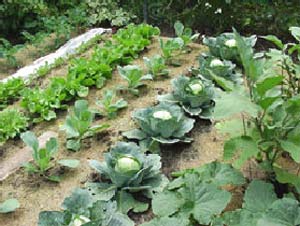
Greenspree, our intrepid green home builder from Canada, has just posted a very interesting piece about just how much land a family would need in order to grow all the food they would need for a year.
How much land do you need to be self sufficient? Again inspired by Red State Green’s recent posts I decided to do some research on my own. Prior to this, in a comment on “A matter of national securityâ€, I used some somewhat high output figures I found on another site that basically said about 0.11 of an acre would be all that is required for a family of four. I decided to find some better numbers and also instead of just going by 2000lbs of food per year per person, use the recommended portions of the Canada Food Guide.
He makes a couple of assumptions, but on the whole I think he proves convincingly that you can live off a rather small parcel of land. Even if you didn’t want to produce ALL of the food you would need, you could conceivably produce a goodly amount of food on a very small chunk of land (or even in containers on a balcony or window sill for you city folk). As someone who grew up on and around farming I can tell you, nothing is more heavenly than a fresh picked tomato, or cucumber right off the vine.
Check out the rest of this very interesting article here.
This is very interesting! I just did a quick calculation, and the total amount of arable and cultivated land on Earth is (according to the World Factbook) about 6.8bn acres, or double what the calculations in this article show for the current world population.
There is a huge range of farming intensity around the world, plus a huge range of environments, but assuming that the average farming density is a bit higher than subsistence, due to intense mechanised practices, this should be less than the figure from the article. But, of course, lots of people eat beef, dairy products, pork and lamb, and that figure is growing as “developing” countries aim for the standards of the industrialised, profligate nations. That really knocks the figure up – along with problems of soil fertility loss and flooding.
All of this makes self-sufficiency very tempting; and communal farming even more so.
Keith